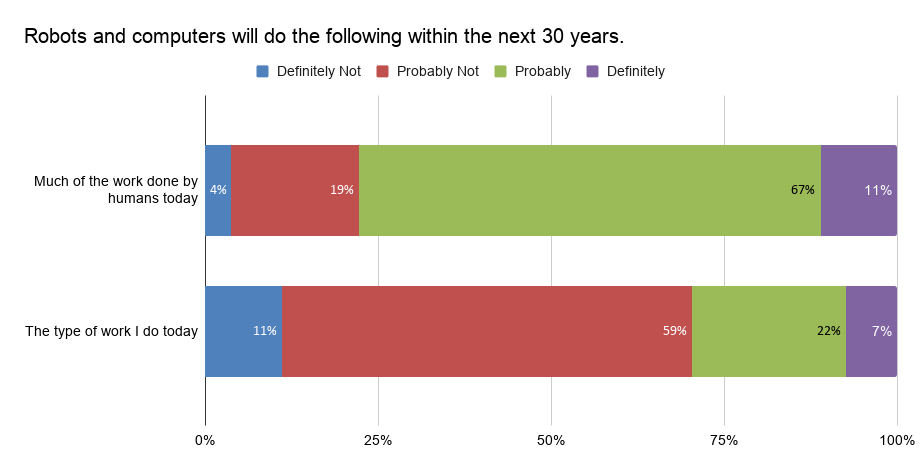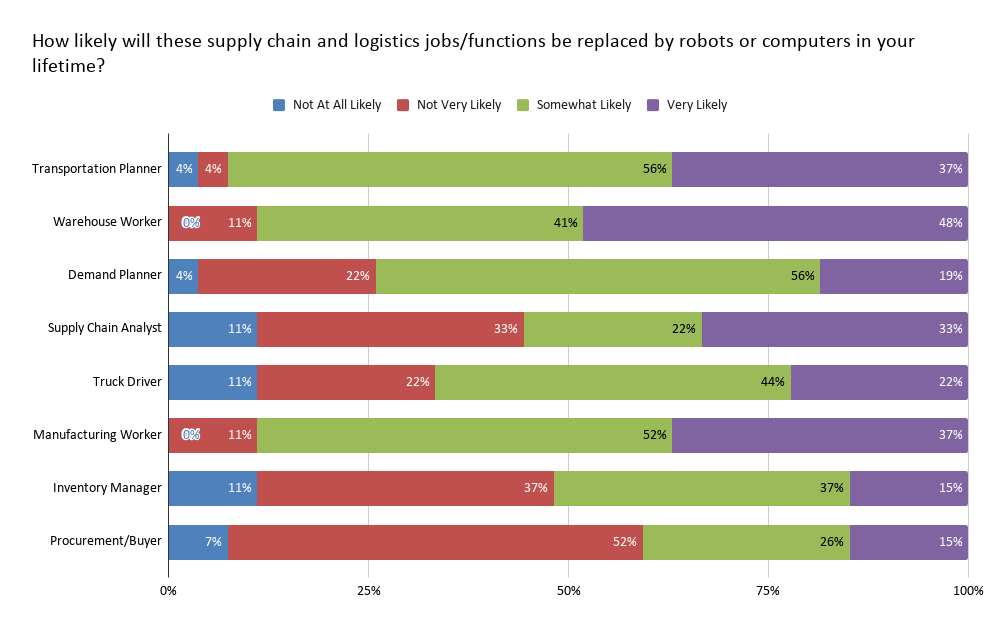In a recent Wall Street Journal article (“The High Cost of Impeding Automation“), Dr. Carl Benedikt Frey from Oxford University writes that “history tells us that policies aimed at restricting or slowing automation come with a steep price tag. It is important to remember that the acceleration in economic growth that followed the Industrial Revolution…was caused by the steady adoption of automation technologies that allowed us to produce more with fewer people.”
What impact will robots and computers have on supply chain and logistics jobs? We asked our Indago members for their take on automation technology in the industry.
Consistent with a similar question asked by the Pew Research Center, 78% of our Indago member respondents believe that within the next 30 years robots and computers will “probably” or “definitely” do much of the work done by humans today. Yet, when it comes to the type of work they do today, only 29% believe that robots and computers will “probably” or “definitely” do it.

Simply put, our members overwhelmingly believe that robots and computers will do other people’s jobs in the future, but not theirs.
(For a related commentary, see the Seven Stages of Robot Replacement as described by Kevin Kelly in his December 2012 Wired article Better Than Human: Why Robots Will — And Must — Take Our Jobs.)
In terms of which supply chain and logistics jobs/functions are most likely to be replaced by robots and computers in our lifetime, “warehouse worker” received the most “very likely” responses (48%), followed by “manufacturing worker” (37%) and “transportation planner” (37%).

“Automation is inevitable,” said one respondent. “Therefore, logistics and supply chain work must evolve to handle tasks [you can’t easily automate] like soft skills and bridging the gap between technologies and people.”
Here are some additional value-added comments from our Indago members, who are all supply chain and logistics professionals from manufacturing, retail, and distribution companies:
“Jobs that require an unwavering safety culture or place employees in positions that could harm them will be the first to be replaced by robots. Employees that perform repetitive functions throughout their day will also be replaced.”
“I think robots will take over tedious and repetitive jobs but they will have difficulty replacing jobs that require personal relationships and are based on human emotions. Blue collar jobs will be automated, and even simple analysis could be conducted by computers.”
“Look at aviation. We have had planes that can fly and land themselves for years. Yet every time I board a plane, there are two pilots sitting up front. There will be functions that are very quickly automated, e.g., autonomous warehouses, which exist today. There will be other functions that will require an input or decision [by a human] before robots/computers take action. It would be [almost] impossible to foresee every possible contingency and have it pre-programmed in a decision matrix. Automation will help increase productivity and profitability. It will boil down to ROI.”
“Roles that deal with exception management, managing people and relationships will remain largely the same. In my view, supply chain planning is already highly automated at larger companies and the limited roles that remain will likely stay for exception management. For warehouse work, my perspective is shaped by working in food where orders are small, just in time, and products are highly variable in shape and size. I see human roles remaining here although I realize other sectors may be far easier to automate fully.”
Do you agree with the feedback and advice of our Indago members? Anything you would add? Post a comment and let us know.
Also, If you’re a supply chain or logistics practitioner from a manufacturing, retail, or distribution company, I encourage you to learn more about Indago and join our research community. It is confidential, there is no cost to join and the time commitment is minimal (2-5 minutes per week) — plus your participation will help support charitable causes like JDRF, American Logistics Aid Network, American Cancer Society, Feeding America, and Make-A-Wish.
You can also follow us on LinkedIn to stay informed of our latest research results and news.









